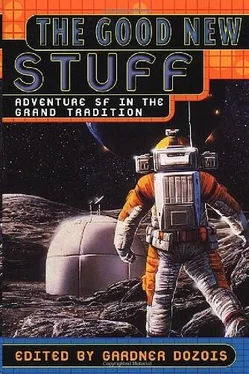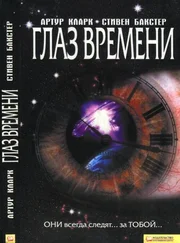Стивен Бакстер - The Good New Stuff
Здесь есть возможность читать онлайн «Стивен Бакстер - The Good New Stuff» весь текст электронной книги совершенно бесплатно (целиком полную версию без сокращений). В некоторых случаях можно слушать аудио, скачать через торрент в формате fb2 и присутствует краткое содержание. Год выпуска: 2002, ISBN: 2002, Издательство: St. Martin's Griffin, Жанр: Фантастика и фэнтези, на английском языке. Описание произведения, (предисловие) а так же отзывы посетителей доступны на портале библиотеки ЛибКат.
- Название:The Good New Stuff
- Автор:
- Издательство:St. Martin's Griffin
- Жанр:
- Год:2002
- ISBN:0-312-26456-9
- Рейтинг книги:3 / 5. Голосов: 1
-
Избранное:Добавить в избранное
- Отзывы:
-
Ваша оценка:
- 60
- 1
- 2
- 3
- 4
- 5
The Good New Stuff: краткое содержание, описание и аннотация
Предлагаем к чтению аннотацию, описание, краткое содержание или предисловие (зависит от того, что написал сам автор книги «The Good New Stuff»). Если вы не нашли необходимую информацию о книге — напишите в комментариях, мы постараемся отыскать её.
The Good New Stuff — читать онлайн бесплатно полную книгу (весь текст) целиком
Ниже представлен текст книги, разбитый по страницам. Система сохранения места последней прочитанной страницы, позволяет с удобством читать онлайн бесплатно книгу «The Good New Stuff», без необходимости каждый раз заново искать на чём Вы остановились. Поставьте закладку, и сможете в любой момент перейти на страницу, на которой закончили чтение.
Интервал:
Закладка:
"Um." She had seen through him. Of course she would have. Why hadn't he realized it?
"So you're a clone. You've had your memories transplanted into a new body, grown from one of your own cells. How old are you? Do you mind my asking?"
"I guess not. Uh… what's the date?"
She told him.
"And the year?"
She laughed, but told him that, too.
"Damn. I missed my one-hundredth birthday. Well, so what? It's not important. Lee, does this change anything?"
"Of course not. Listen, I could tell the first time, that first night together. You had that puppy-dog eagerness, all right, but you knew how to handle yourself. Tell me: what's it like?"
"The second childhood, you mean?" He reclined on the gently rocking raft and looked at the little clot of stars. "It's pretty damn great. It's like living in a dream. What kid hasn't wanted to live alone on a tropic isle? I can, because there's an adult in me who'll keep me out of trouble. But for the last seven years I've been a kid. It's you that finally made me grow up a little, maybe sort of late, at that."
"I'm sorry. But it felt like the right time."
"It was. I was afraid of it at first. Listen, I know that I'm really a hundred years old, see? I know that all the memories are ready for me when I get to adulthood again. If I think about it, I can remember it all as plain as anything. But I haven't wanted to, and in a way, I still don't want to. The memories are suppressed when you opt for a second childhood instead of being transplanted into another full-grown body."
"I know."
"Do you? Oh, yeah. Intellectually. So did I, but I didn't understand what it meant. It's a nine- or ten-year holiday, not only from your work, but from yourself. When you get into your nineties, you might find that you need it."
She was quiet for a while, lying beside him without touching.
"What about the reintegration? Is that started?"
"I don't know. I've heard it's a little rough. I've been having dreams about something chasing me. That's probably my former self, right?"
"Could be. What did your older self do?"
He had to think for a moment, but there it was. He'd not thought of it for eight years.
"I was an economic strategist."
Before he knew it, he found himself launching into an explanation of offensive economic policy.
"Did you know that Pluto is in danger of being gutted by currency transfers from the Inner Planets? And you know why? The speed of light, that's why. Time lag. It's killing us. Since the time of the Invasion of Earth it's been humanity's idea— and a good one, I think— that we should stand together. Our whole cultural thrust in that time has been toward a total economic community. But it won't work at Pluto. Independence is in the cards."
She listened as he tried to explain things that only moments before he would have had trouble understanding himself. But it poured out of him like a breached dam, things like inflation multipliers, futures buying on the oxygen and hydrogen exchanges, phantom dollars and their manipulation by central banking interests, and the invisible drain.
"Invisible drain? What's that?"
"It's hard to explain, but it's tied up in the speed of light. It's an economic drain on Pluto that has nothing to do with real goods and services, or labor, or any of the other traditional forces. It has to do with the fact that any information we get from the Inner Planets is already at least nine hours old. In an economy with a stable currency— pegged to gold, for instance, like the classical economies on Earth— it wouldn't matter much, but it would still have an effect. Nine hours can make a difference in prices, in futures, in outlook on the markets. With a floating exchange medium, one where you need the hourly updates on your credit meter to know what your labor input will give you in terms of material output— your personal financial equation, in other words— and the inflation multiplier is something you simply must have if the equation is going to balance and you're not going to be wiped out, then time is really of the essence. We operate at a perpetual disadvantage on Pluto in relation to the Inner Planet money markets. For a long time it ran on the order of point three percent leakage due to outdated information. But the inflation multiplier has been accelerating over the years. Some of it's been absorbed by the fact that we've been moving closer to the I.P.; the time lag has been getting shorter as we move into summer. But it can't last. We'll reach the inner point of our orbit and the effects will really start to accelerate. Then it's war."
"War?" She seemed horrified, as well she might be.
"War, in the economic sense. It's a hostile act to renounce a trade agreement, even if it's bleeding you white. It hits every citizen of the Inner Planets in the pocketbook, and we can expect retaliation. We'd be introducing instability by pulling out of the Common Market."
"How bad will it be? Shooting?"
"Not likely. But devastating enough. A depression's no fun. And they'll be planning one for us."
"Isn't there any other course?"
"Someone suggested moving our entire government and all our corporate headquarters to the Inner Planets. It could happen, I guess. But who'd feel like it was ours? We'd be a colony, and that's a worse answer than independence, in the long run."
She was silent for a time, chewing it over. She nodded her head once; he could barely see the movement in the darkness.
"How long until the war?"
He shrugged. "I've been out of touch. I don't know how things have been going. But we can probably take it for another ten years or so. Then we'll have to get out. I'd stock up on real wealth if I were you. Canned goods, air, water, so forth. I don't think it'll get so bad that you'll need those things to stay alive by consuming them. But we may get to a semibarter situation where they'll be the only valuable things. Your credit meter'll laugh at you when you punch a purchase order, no matter how much work you've put into it."
The raft bumped. They had arrived at the edge of the world.
They moored the raft to one of the rocks on the wall that rose from the open ocean. They were five kilometers out of Rarotonga. They waited for some light as the sun began to rise, then started up the rock face.
It was rough: blasted out with explosives on this face of the dam. It went up at a thirty-degree angle for fifty meters, then was suddenly level and smooth as glass. The top of the dam at the edge of the world had been smoothed by cutting lasers into a vast table top, three hundred kilometers long and four kilometers wide. They left wet footprints on it as they began the long walk to the edge.
They soon lost any meaningful perspective on the thing. They lost sight of the sea-edge, and couldn't see the dropoff until they began to near it. By then, it was full light. Timed just right, they would reach the edge when the sun came up and they'd really have something to see.
A hundred meters from the edge when she could see over it a little, Lee began to unconsciously hang back. Piri didn't prod her. It was not something he could force someone to see. He'd reached this point with others, and had to turn back. Already, the fear of falling was building up. But she came on, to stand beside him at the very lip of the canyon.
Pacifica was being built and filled in three sections. Two were complete, but the third was still being hollowed out and was not yet filled with water except in the deepest trenches. The water was kept out of this section by the dam they were standing on. When it was completed, when all the underwater trenches and mountain ranges and guyots and slopes had been built to specifications, the bottom would be covered with sludge and ooze and the whole wedge-shaped section flooded. The water came from liquid hydrogen and oxygen on the surface, combined with the limitless electricity of fusion powerplants.
Читать дальшеИнтервал:
Закладка:
Похожие книги на «The Good New Stuff»
Представляем Вашему вниманию похожие книги на «The Good New Stuff» списком для выбора. Мы отобрали схожую по названию и смыслу литературу в надежде предоставить читателям больше вариантов отыскать новые, интересные, ещё непрочитанные произведения.
Обсуждение, отзывы о книге «The Good New Stuff» и просто собственные мнения читателей. Оставьте ваши комментарии, напишите, что Вы думаете о произведении, его смысле или главных героях. Укажите что конкретно понравилось, а что нет, и почему Вы так считаете.











